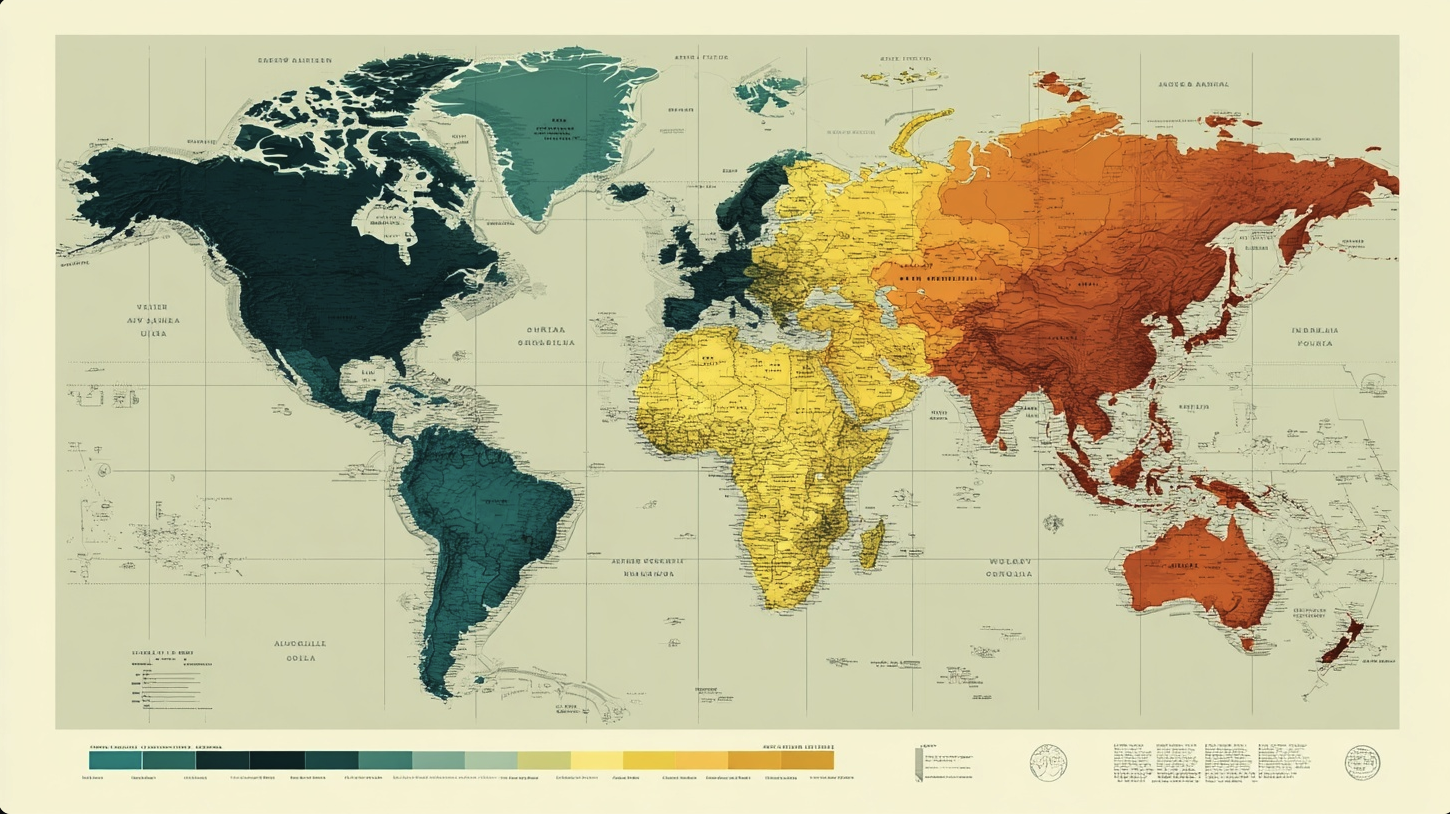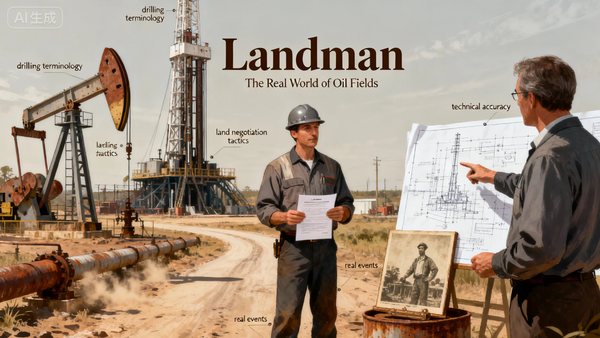Global resonance: Landman's international reception and cross-cultural

When Landman premiered on Paramount+ in November 2024, it didn't just capture American audiences—it immediately became a global streaming phenomenon, attracting 35 million viewers worldwide and setting platform records. But the series' international success raises fascinating questions: How does a show so deeply rooted in Texas oil culture, American class dynamics, and regional musical traditions translate across borders? What does its global viewership tell us about contemporary streaming culture, cultural export, and the universality of economic critique?
The Numbers: A Global Streaming Success
Landman's performance on Paramount+ demonstrates the platform's increasingly international reach and the series' cross-border appeal.
First Week Performance: The series premiere attracted 35 million global viewers across Paramount+'s international markets, which include the United States, Canada, United Kingdom, Australia, Latin America, and select European territories. This figure represents one of the strongest debuts in Paramount+ history, rivaling even the platform's flagship Yellowstone universe content.
Sustained Engagement: More remarkably, Landman remained in Paramount+'s global top 10 for over 160 days—more than five months of continuous viewership. This sustained engagement suggests the series found audiences beyond initial curiosity, building word-of-mouth momentum across different markets and time zones.
Platform Growth Indicator: Paramount+ executives noted that Landman drove significant subscriber acquisition in international markets, particularly in English-speaking territories (UK, Australia, Canada) but also in dubbed/subtitled markets across Europe and Latin America. The series became a flagship for the platform's global expansion strategy.

Regional Reception Patterns
While comprehensive market-by-market data remains proprietary, industry reports and social media analysis reveal distinct regional reception patterns.
North America: Home Territory Dominance
Unsurprisingly, Landman performed strongest in its home territory. United States viewership led globally, with particular strength in:
- Texas and Southern States: The series achieved near-Yellowstone levels of viewership in oil-producing states (Texas, Oklahoma, North Dakota) and throughout the American South. For these audiences, the series offers regional recognition and cultural specificity rarely seen in prestige television.
- Rural and Small-Town America: Streaming data suggests strong performance in non-metropolitan areas, where working-class economic themes and country music aesthetics resonate most directly. The series found its core audience among viewers who see their own economic realities reflected on screen.
- Canada: Strong performance across Canadian markets, particularly in Alberta (oil industry presence) and rural provinces. Canadian audiences responded to similar themes of resource extraction, regional economic dependence, and working-class identity.
United Kingdom and Ireland: Class Consciousness
British and Irish audiences engaged strongly with Landman, though through different interpretive lenses.
Class Analysis Framework: UK viewers, steeped in cultural traditions of class analysis and social realism, approached Landman through familiar frameworks. British critics compared the series to Ken Loach's working-class dramas and Mike Leigh's social realism, recognizing shared concerns about economic inequality and systemic exploitation.
Oil Industry Parallels: Scottish audiences, particularly in Aberdeen and surrounding North Sea oil regions, found direct parallels to their own oil industry experiences. The series resonated as a transatlantic mirror, reflecting similar dynamics of boom-and-bust cycles, worker exploitation, and corporate-labor tensions.
American Culture Fascination: For broader UK audiences, Landman functions as ethnographic window into American working-class culture, offering insight into regions rarely represented in exported American television. The series satisfies British audience appetite for authentic American regional culture beyond coastal elite narratives.
Australia: Resource Economy Recognition
Australian audiences demonstrated surprisingly strong engagement, making Landman a consistent top-performer on Paramount+ Australia.
Mining Industry Parallels: Australia's massive mining sector creates natural resonance. Australian viewers recognize similar dynamics in their own resource extraction industries—remote work sites, fly-in/fly-out labor arrangements, environmental controversies, and the economic dominance of resource companies in regional communities.
Regional Identification: Viewers in Western Australia (mining hub) and Queensland (coal and gas) reported feeling seen by the series, despite geographic and industry differences. The fundamental tensions—capital vs. labor, extraction vs. environment, prosperity vs. cost—translate directly.
American Western Tradition: Australian audiences have long engaged with American Western aesthetics (from classic films to Yellowstone). Landman's positioning as contemporary Western, replacing cattle ranches with oil rigs, builds on established cultural appetite.
Continental Europe: Dubbed and Subtitled Markets
European reception varied significantly by market, language, and cultural context.
Germany: Strong performance, particularly among audiences interested in American culture and economic critique. German viewers, with cultural traditions of social commentary and skepticism toward unfettered capitalism, appreciated the series' structural analysis of economic systems. The series found audiences among both American culture enthusiasts and those interested in critical perspectives on capitalism.
France: More mixed reception. French audiences, with distinct cultural attitudes toward American content, engaged selectively. Art-house and cinephile audiences praised the cinematography and thematic depth, while mainstream audiences found the series too specifically American. French critics drew comparisons to Terrence Malick's visual poetry and the Dardenne brothers' working-class realism.
Spain and Italy: Moderate performance, with audiences responding primarily to family drama elements and visual spectacle rather than specific economic critique. Cultural distance from American regional working-class culture created barriers, though universal themes of family dysfunction and economic pressure maintained engagement.
Scandinavia: Surprisingly strong performance in Nordic markets (Sweden, Norway, Denmark, Finland). Scandinavian audiences, with strong social democratic traditions and high environmental consciousness, engaged critically with the series' portrayal of extractive capitalism. The series functioned almost as cautionary tale, illustrating unfettered market forces in contrast to Nordic regulated capitalism.
Latin America: Economic Resonance
Latin American markets demonstrated robust engagement, particularly in oil-producing nations.
Mexico: Strong viewership, with Mexican audiences recognizing parallel dynamics in PEMEX (state oil company) and broader extraction industries. The series' themes of corruption, political pressure, and worker exploitation resonated deeply, though Mexican viewers noted differences in state vs. private oil industry dynamics.
Brazil: Substantial engagement, particularly among audiences familiar with Petrobras and domestic oil industry. Brazilian viewers connected economic critique to their own experiences with resource extraction, corruption scandals, and environmental controversies in the Amazon.
Argentina and Venezuela: Notable interest in oil-producing regions, where audiences recognized familiar patterns of resource curse, economic dependency, and political corruption. The series' American setting provided critical distance for discussing controversial domestic issues.
Colombia: Strong performance, with audiences drawing parallels to oil industry violence, environmental destruction, and corporate-government collusion in Colombian history. The series functioned as both entertainment and political commentary.
Cultural Translation: What Travels, What Doesn't
Landman's international journey reveals what elements of American regional culture translate globally and what remains opaque.
Universal Themes That Resonate
Economic Inequality: The series' core critique of wealth distribution, risk allocation, and class structure translates seamlessly. Viewers worldwide recognize the dynamic of workers bearing risks while executives reap profits—this isn't American-specific; it's global capitalism.
Environmental Cost: Concerns about extraction industries' environmental impact are genuinely international. European, Latin American, and Australian audiences all engage with this dimension, often more critically than American audiences.
Family Under Economic Pressure: Tommy's fractured family relationships, the way work invades domestic life, the toll of economic stress on personal relationships—these dynamics transcend cultural specificity. Families worldwide recognize this strain.
Masculine Identity Crisis: The series' exploration of traditional masculine ideals under contemporary economic conditions resonates internationally, particularly in cultures facing similar transitions from industrial/extractive economies to service/information economies.
Cultural Elements That Create Distance
Texas Regional Specificity: The series' deep rootedness in Texas culture—linguistic patterns, musical references, cultural assumptions—creates barriers for non-American audiences. What Texans recognize as authentic regional representation, international viewers may experience as exotic or inscrutable.
Country Music Culture: The soundtrack's heavy reliance on red dirt and outlaw country, while meaningful to American regional audiences, means little to viewers unfamiliar with this musical tradition. International viewers may hear only generic "American music" rather than class-specific cultural markers.
Oil Industry Particulars: The specific practices, terminology, and regulatory environment of American oil extraction don't always translate. International audiences may lack context for understanding specific conflicts or technical references.
American Political Context: References to American political dynamics, regulatory frameworks, and cultural conflicts (environmentalism debates, political polarization) require background knowledge international audiences may not possess.
Social Media and Critical Discourse: Global Conversations
Social media analysis reveals how different cultural communities discuss Landman online.
English-Language Social Media
Twitter/X Discourse: American audiences dominate English-language discussion, focusing on:
- Comparisons to Yellowstone and Sheridan's other work
- Debates about series' political stance (pro-oil vs. critique)
- Regional authenticity discussions
- Billy Bob Thornton's performance praise
- Soundtrack appreciation and playlist sharing
UK and Australian audiences contribute perspectives on:
- Cross-national class analysis
- Comparisons to their own resource industries
- Discussion of American exceptionalism and its limits
- Environmental critique often more pronounced than in American discourse
Reddit Communities: International subreddits show diverse interpretations:
- r/LandmanTV (primarily American) focuses on plot details, character analysis, Easter eggs
- r/television (international) discusses series within broader television landscape, comparing to other prestige dramas
- National subreddits frame discussions through local contexts (Australian mining, UK class politics, Latin American resource extraction)
Non-English Language Discourse
Spanish-Language Communities: Focus heavily on political and economic themes, drawing explicit parallels to domestic situations. Discussion often more politically engaged than English-language discourse, with audiences using series as springboard for discussing national resource politics.
German-Language Communities: Emphasis on artistic and cinematic qualities, detailed analysis of visual and sonic design. German-speaking audiences engage intellectually with series' formal elements and thematic sophistication.
French-Language Communities: More divided reception, with cinephile communities praising series while popular discourse remains skeptical of American cultural products. French critics position Landman within American cinema tradition rather than television landscape.
Critical Reception Across Markets
Professional critics in different markets emphasized distinct aspects.
American Critics: Focus on genre positioning (neo-Western), comparison to Sheridan's previous work, authenticity of regional representation, and contemporary relevance of class themes. American criticism often debates series' political implications—is it defending or critiquing oil industry?
British Critics: Emphasize class analysis and social realism traditions. British reviews frequently compare Landman to UK working-class dramas, positioning it as American equivalent to British social realism. Environmental themes receive more critical attention than in American reviews.
Australian Critics: Highlight parallels to Australian mining industry and question whether series offers sufficient environmental critique. Australian criticism tends toward more explicit political engagement, questioning series' ideological stance more directly.
European Critics: Continental European reviews emphasize cinematic qualities, visual and sonic sophistication, and thematic complexity. European critics often position Landman as art television rather than popular entertainment, analyzing it through auteur theory frameworks.
Latin American Critics: Focus on economic critique and political implications, often reading series through dependency theory and post-colonial frameworks. Latin American criticism explicitly connects series to regional experiences with resource extraction and neo-colonial economic relations.
The Paradox of American Cultural Export
Landman's global success illuminates contemporary paradoxes of American cultural export.
Specificity as Universal: The series succeeds internationally precisely because of—not despite—its regional specificity. By grounding itself deeply in Texas oil culture, Landman achieves authenticity that translates as artistic credibility internationally. Audiences worldwide respect and engage with genuinely rendered regional culture more than they do homogenized "international" content.
Critique Travels Better Than Celebration: Landman's critical stance toward American capitalism may actually enhance its international appeal. Non-American audiences often prefer American content that acknowledges America's contradictions rather than uncritically celebrating American exceptionalism.
Streaming as Cultural Equalizer: Paramount+'s global platform creates simultaneous release and access, allowing international audiences to engage with content in real-time rather than experiencing American culture through delayed, filtered channels. This immediacy changes how American content functions culturally.
Subtitles and Dubbing Technologies: Improved dubbing quality and comprehensive subtitle options lower barriers to entry. While cultural specifics may be lost in translation, core narratives and emotional content translate effectively enough to maintain engagement.
What Global Success Reveals
Landman's international performance offers insights into contemporary streaming culture and global audience appetites.
Appetite for Working-Class Narratives: International success suggests global audience hunger for working-class perspectives across cultures. While Hollywood typically exports elite or aspirational narratives, Landman demonstrates that authentically rendered working-class stories find international audiences.
Environmental Consciousness: Strong international engagement, particularly in markets with high environmental awareness, suggests this theme resonates globally. Environmental cost of extraction may be series' most universally relevant theme.
Prestige Television as Global Culture: The series participates in emerging global prestige television culture, where sophisticated, cinematically ambitious series circulate internationally among educated, culturally engaged audiences regardless of national origin.
Taylor Sheridan as Global Brand: Sheridan's authorial brand travels internationally, with global audiences seeking his work based on previous series' reputation. This represents television creator as international auteur, comparable to film directors.
Conclusion: Local Stories, Global Structures
Landman's journey from Texas oil patches to global streaming platforms reveals how deeply local stories can illuminate universal structures. The series succeeds internationally not by diluting its specificity but by rendering it so authentically that viewers worldwide recognize their own experiences reflected through American regional lens.
A British viewer watching Tommy navigate corporate-labor tensions sees their own country's class dynamics; an Australian mining worker recognizes familiar exploitation patterns; a Mexican audience member connects to resource extraction politics; a German viewer appreciates sophisticated critique of capitalism. The specific details are Texan, but the structures are global.
This is the achievement of Landman's international success: demonstrating that in an age of global capitalism, local stories about economic extraction, class division, and human cost resonate across borders because the underlying systems are themselves transnational. The oil might be in Texas, but the logic of extraction—capital, labor, risk, profit, cost—operates worldwide.
When audiences from London to São Paulo, from Sydney to Stockholm, tune in to watch Tommy Norris chain-smoke in West Texas oil fields, they're not just consuming American cultural product—they're recognizing their own world reflected through a specific lens. That recognition, that resonance across cultural distance, suggests that Landman has tapped into something genuinely transnational: the lived experience of contemporary capitalism and its human toll.
The series' global success proves that authentic, specific, regionally-grounded storytelling can travel farther and resonate deeper than homogenized "international" content ever could. In trying to tell one specific American story well, Taylor Sheridan and Christian Wallace ended up telling a story that audiences worldwide recognize as, in essential ways, their own.



